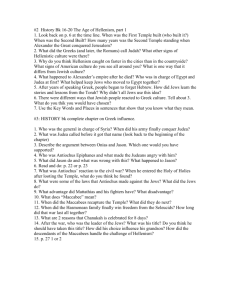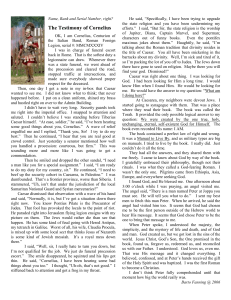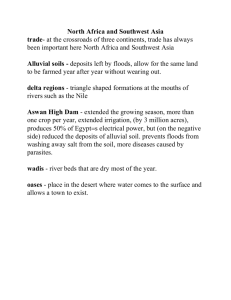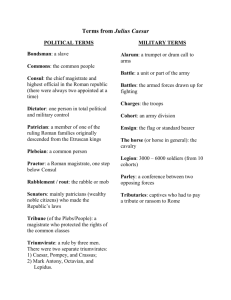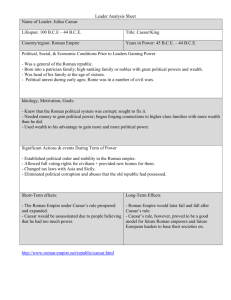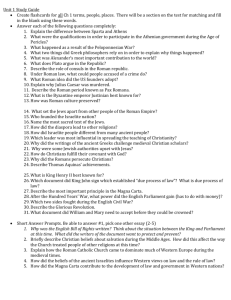Acts 25_8 - Amador Bible Studies
advertisement
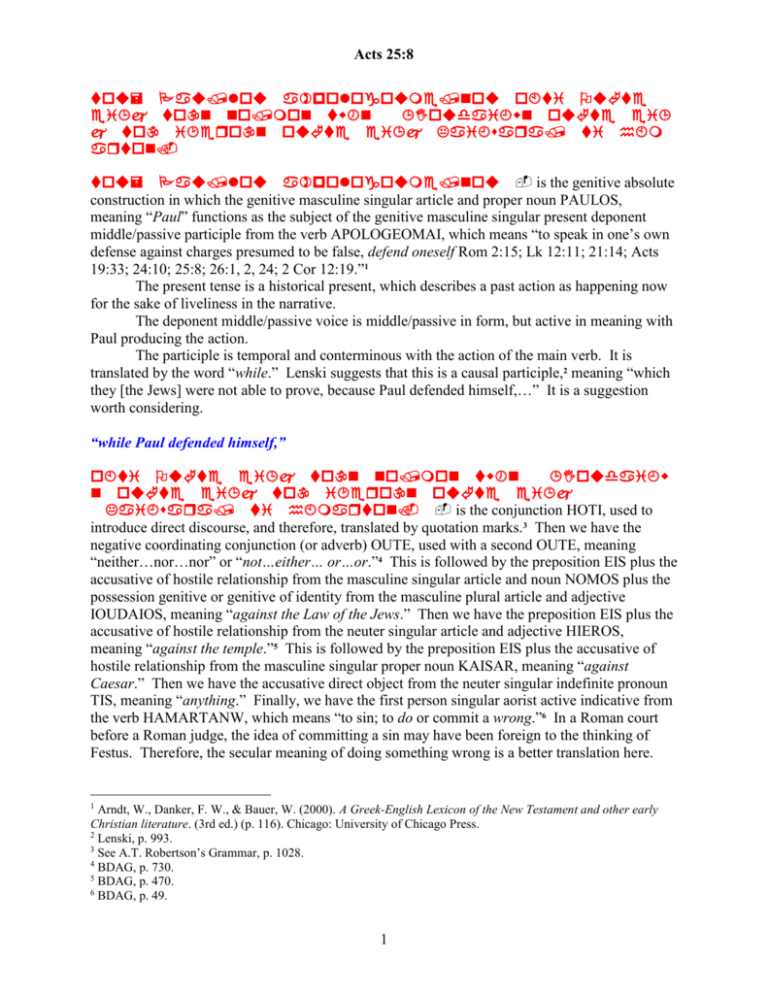
Acts 25:8 is the genitive absolute construction in which the genitive masculine singular article and proper noun PAULOS, meaning “Paul” functions as the subject of the genitive masculine singular present deponent middle/passive participle from the verb APOLOGEOMAI, which means “to speak in one’s own defense against charges presumed to be false, defend oneself Rom 2:15; Lk 12:11; 21:14; Acts 19:33; 24:10; 25:8; 26:1, 2, 24; 2 Cor 12:19.”1 The present tense is a historical present, which describes a past action as happening now for the sake of liveliness in the narrative. The deponent middle/passive voice is middle/passive in form, but active in meaning with Paul producing the action. The participle is temporal and conterminous with the action of the main verb. It is translated by the word “while.” Lenski suggests that this is a causal participle,2 meaning “which they [the Jews] were not able to prove, because Paul defended himself,…” It is a suggestion worth considering. “while Paul defended himself,” is the conjunction HOTI, used to introduce direct discourse, and therefore, translated by quotation marks.3 Then we have the negative coordinating conjunction (or adverb) OUTE, used with a second OUTE, meaning “neither…nor…nor” or “not…either… or…or.”4 This is followed by the preposition EIS plus the accusative of hostile relationship from the masculine singular article and noun NOMOS plus the possession genitive or genitive of identity from the masculine plural article and adjective IOUDAIOS, meaning “against the Law of the Jews.” Then we have the preposition EIS plus the accusative of hostile relationship from the neuter singular article and adjective HIEROS, meaning “against the temple.”5 This is followed by the preposition EIS plus the accusative of hostile relationship from the masculine singular proper noun KAISAR, meaning “against Caesar.” Then we have the accusative direct object from the neuter singular indefinite pronoun TIS, meaning “anything.” Finally, we have the first person singular aorist active indicative from the verb HAMARTANW, which means “to sin; to do or commit a wrong.”6 In a Roman court before a Roman judge, the idea of committing a sin may have been foreign to the thinking of Festus. Therefore, the secular meaning of doing something wrong is a better translation here. 1 Arndt, W., Danker, F. W., & Bauer, W. (2000). A Greek-English Lexicon of the New Testament and other early Christian literature. (3rd ed.) (p. 116). Chicago: University of Chicago Press. 2 Lenski, p. 993. 3 See A.T. Robertson’s Grammar, p. 1028. 4 BDAG, p. 730. 5 BDAG, p. 470. 6 BDAG, p. 49. 1 Acts 25:8 The aorist tense is a culminative aorist, which views the entire past action as a fact with emphasis on its completion. This emphasis is brought out in the translation by the use of the English auxiliary verb “have.” The active voice indicates that Paul has not produced the action. The indicative mood is declarative for a dogmatic statement of fact. “‘I have not done anything wrong either against the Law of the Jews or against the temple or against Caesar.’” Acts 25:8 corrected translation “while Paul defended himself, ‘I have not done anything wrong either against the Law of the Jews or against the temple or against Caesar.’” Explanation: 1. “while Paul defended himself,” a. This verse is the continuation of the sentence begun in the previous verse. The entire sentence now reads: “After he arrived, the Jews who came down from Jerusalem stood around him, bringing many and serious charges, which they were not able to prove, while Paul defended himself, ‘I have not done anything wrong either against the Law of the Jews or against the temple or against Caesar.’” b. Paul’s accusers are finished accusing him. With their conclusion, Festus would have signaled to Paul to begin his defense (as Felix had done in the previous trial, Acts 24:10). c. Luke proceeds to quote Paul’s defense in brief, since Luke was probably in attendance at the trial. d. Paul had a great deal more to say than his conclusion quoted by Luke. Luke only gives us the conclusion of his entire defense, since the defense of Paul’s position has already been described earlier in this epistle. 2. “‘I have not done anything wrong either against the Law of the Jews or against the temple or against Caesar.’” a. Paul refutes the three major charges against him. (1) He has done nothing contrary to the Mosaic Law. (2) He has done nothing to desecrate or profane the temple. (3) He has done nothing against the power, authority, or rulership of Rome. He has committed no sedition or any treason. b. “Luke did not specify their charges, but it is clear from Paul's response that they were the same as those directed at him by the Asian Jews and Tertullus-teaching against the Jewish law (21:28), defiling the temple (21:28; 24:6), and plotting treason (24:5). Paul emphatically denied the charge of sedition; he had done nothing ‘against Caesar’. It was this charge that had kept him in Roman hands. The other charges, especially the temple charge, would place him under Jewish jurisdiction; and that was the last thing Paul wanted.”7 c. The truth of this case is that Paul “has not done anything wrong.” The Jews know it and have no witnesses against Paul to prove that he has done anything wrong. 7 Polhill, p. 490. 2 Acts 25:8 (1) The Jews cannot provide a single witness that Paul broke any law of Moses or that he even spoke against the Mosaic Law. (2) The Jews cannot provide a single witness that Paul desecrated the temple in any way. (3) The Jews cannot prove that Paul is the ringleader of a group of people attempting to overthrown the Roman government. In fact, Festus has Lysias’s own letter to the contrary. d. Again the Jews have nothing but empty charges with no evidence and no witnesses, and every person in that courtroom knows it. e. “Paul had had two years in which to meditate on his case. In his hearing before Felix he had not made a reference to Caesar and Roman law; he does so now. The point is that only infractions against Jewish law and usage had been charged against him, no infractions whatever against Roman law. This point could, of course, be strained; inasmuch as Roman law tolerated the Jewish religion, an act committed against that religion could be viewed as one committed against Roman law. But the Jews had not ventured to present such an argument. The reason, then, that Paul mentions Caesar is to bring to the attention of this Roman judge, whom he now sees for the first time, the fact that no infraction of a Roman law has even as much as been charged in this case. The charges deal with Jewish doctrine and practice, and even these charges are baseless. Why, then, does this Roman want to proceed with such a case? ‘Nor against Caesar’ was a telling point, indeed.”8 8 Lenski, pp. 993f. 3

